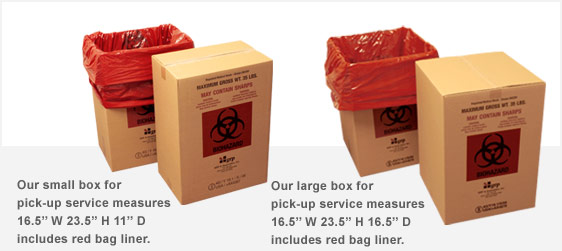Economical Medical Waste Disposal Services for Clinics and Hospitals
Wiki Article
Navigating Medical Waste Disposal: Important Solutions for Health Care Facilities
In the intricate landscape of healthcare operations, the management of clinical waste is an important facet that requires careful focus. Health care facilities, whether little centers or big healthcare facilities, are handed over with the responsibility of handling, dealing with, and throwing away a wide array of medical waste streams. The intricacies associated with navigating through the governing needs, making certain appropriate waste segregation, and executing safe collection and transportation procedures are extremely important. Understanding the essential solutions that sustain medical waste disposal is not just a matter of conformity but likewise a basic part in protecting public health and wellness and environmental wellness. The intricacies of this process are essential for healthcare facilities, and the expertise offered in this realm plays a pivotal function in preserving the honesty of health care systems.Regulatory Conformity Support
For healthcare facilities, guaranteeing governing conformity assistance is necessary to maintain appropriate handling and disposal of medical waste. Abiding by laws established forth by companies such as the Environmental Security Firm (EPA) and the Occupational Safety And Security and Wellness Administration (OSHA) is crucial to avoid ecological contamination, shield public health, and avoid prospective lawful effects. Regulatory compliance assistance offers healthcare centers with support on exactly how to appropriately segregate, shop, transportation, and deal with various sorts of medical waste according to neighborhood, state, and government regulations. This support consists of assistance in creating and executing detailed waste monitoring strategies, performing regular staff training sessions, and carrying out audits to make certain continuous conformity. By partnering with regulative compliance experts, medical care centers can stay updated on progressing laws, minimize threats linked with incorrect garbage disposal, and eventually add to a more secure and a lot more lasting environment for all.Waste Segregation Advice

Medical care centers must give clear guidelines and training to staff on exactly how to segregate waste effectively. This includes dividing general waste from unsafe products such as sharps, transmittable waste, pharmaceuticals, and chemical waste.
Collection and Transportation Providers

Correct collection and transport solutions are important parts of the medical garbage disposal process in health care centers. These services guarantee that unsafe materials are dealt with safely and in conformity with laws to secure both the setting and public health. Health care facilities depend on specialized waste monitoring business to offer efficient collection and transport solutions customized to their requirements.
Medical waste collection involves setting apart different kinds of waste at the factor of generation, utilizing color-coded bags or containers to compare basic, harmful, pharmaceutical, and various other waste streams. Educated employees have to perform this job to protect against contamination and ensure appropriate disposal. When gathered, the waste is transported in committed lorries equipped to deal with unsafe products safely. These automobiles abide by rigorous security criteria and adhere to designated courses to certified treatment facilities for disposal through methods such as incineration, sanitation, or landfilling.
Therapy and Disposal Solutions
In the realm of medical waste disposal for medical care facilities, after the important phase of collection and transport services, the emphasis moves in the direction of applying reliable therapy and disposal options. Treatment solutions often involve procedures such click to investigate as autoclaving, which makes use of vapor under stress to disinfect the waste. This technique blog is generally utilized for transmittable waste that should be made non-hazardous before disposal. Another prevalent therapy method is incineration, where waste undergoes high temperatures in regulated settings to decrease its volume and remove microorganisms.Disposal options incorporate the final step in the medical waste monitoring procedure. Reusing and source healing are additionally getting traction as sustainable disposal choices for particular kinds of medical waste materials.
Efficient therapy and disposal remedies are paramount in making certain compliance with regulations and securing public wellness and the setting. Health care centers must thoroughly assess and choose ideal methods that align with their waste administration goals and sustainability efforts.
Personnel Training and Education And Learning

To efficiently manage clinical garbage disposal in healthcare facilities, comprehensive staff training and education and learning play a crucial duty in ensuring adherence to regulatory demands and maintaining a secure environment. Correct training gears up team with the knowledge and abilities needed to manage different kinds of clinical waste, segregate them appropriately, and package them safely for disposal. By informing staff members on the threats connected with improper handling of clinical waste, facilities can reduce the chance of mishaps, contamination, and regulatory offenses.

Verdict
In conclusion, health care facilities count on essential clinical waste disposal services to make certain governing conformity, appropriate waste partition, secure collection and transport, reliable therapy and disposal, as well as team training and education. These solutions play a vital duty in keeping the health and wellness of both medical care employees and the general public, additional hints highlighting the significance of appropriate monitoring of medical waste in medical care settings.For healthcare centers, making sure regulatory conformity support is important to preserve appropriate handling and disposal of clinical waste. Waste partition involves classifying various kinds of clinical waste to ensure suitable handling, treatment, and disposal. This consists of dividing basic waste from hazardous products such as sharps, transmittable waste, pharmaceuticals, and chemical waste.Medical waste collection involves segregating various kinds of waste at the factor of generation, utilizing color-coded bins or bags to identify in between basic, unsafe, pharmaceutical, and various other waste streams.In the realm of medical waste disposal for healthcare facilities, after the critical stage of collection and transportation services, the focus changes in the direction of carrying out effective therapy and disposal options.
Report this wiki page